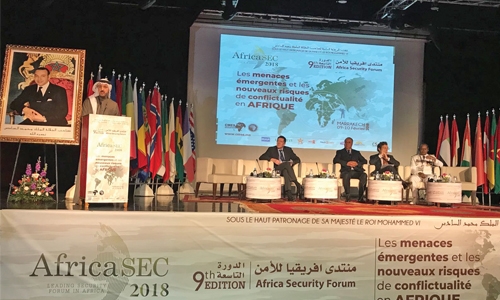Iran, Qatar undermining regional stability: official
Rabat : A top Bahraini official yesterday slammed Iran and Qatar for pursuing expansionist policies and attempts to destabilise the region by ‘forming and funding terrorist outfits”.
Iran’s expansionist project since 1979, Dr Shaikh Abdullah bin Ahmed Al Khalifa said, “contravenes all international laws and covenants.”
Speaking during the opening ceremony of the 9th edition of the Marrakech Security Forum, Dr Shaikh Abdullah, the Board of Trustees Chairman of Bahrain Centre for Strategic, International and Energy Studies (DERASAT), stressed: “Iran is carrying out a clear programme to infiltrate countries with its ‘new generation wars’, a dream to revive the bygone Persian empire.”
He warned: “Iran is pursuing large-scale operations to export the revolution within the so-called “Iranian Space” by forming and funding terrorist militias, equipping them with weapons and using oriented media.”
The Derasat Chairman highlighted Energy security and repercussions of the economic modernisation as the other challenges facing the Arabian Gulf region.
The forum was organised by the Moroccan Centre for Strategic Studies in partnership with the African Federation for Strategic Studies on February 9 and 10.
Qatar’s role
On Qatar’s subversive role, Dr Shaikh Abdullah highlighted Qatari stances since 1995, defining it as “constant and systematic targeting of GCC and Arab countries”.
Bahrain, Saudi Arabia and the UAE, he said, have given several opportunities for the Qatari regime to stop its hostile practices. “However, it failed to meet all obligations in the Riyadh Agreement of 2013 as well as the complementary agreement and its executive mechanisms of 2014 and continued to support and fund terrorist groups and unleashed a discourse of provocation and hatred in the mass media.”
Cyberterrorism
The Derasat Chairman also underlined the danger of cyber terrorism as a non-traditional threat. He pointed out that in the first quarter of 2016 the Bahraini public institutions faced around 3000 cyber attacks, an average of 500 attacks every month.
Iran was behind most of those attacks, he noted, pointing out steps taken by the GCC countries, led by Saudi Arabia, to promote regional security and deter dangers, including the setting up of the Arab Coalition to Support Legitimacy in Yemen and the Islamic Military Counter-terrorism Alliance.
Related Posts

